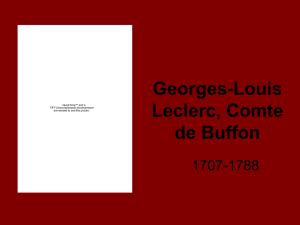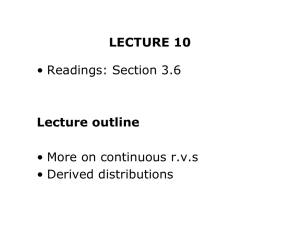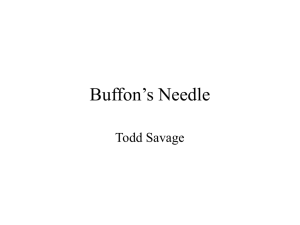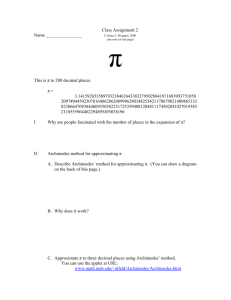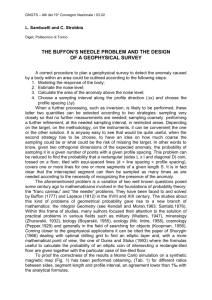Des Époques de la Nature Buffon’s theory of the earth
advertisement
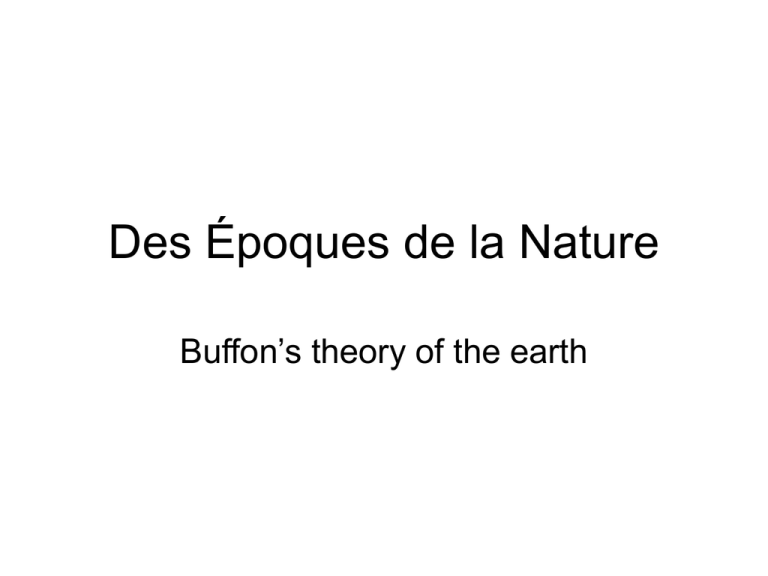
Des Époques de la Nature Buffon’s theory of the earth Buffon & a Mastodon Tooth Buffon’s Works • Histoire Naturelle, Génèrale et Paticulière Published in 1749 (1st three volumes) & subsequently. 35 published during Buffon’s lifetime, laying out all that was known of natural history at the time. 12 volumes on mammals (beginning with the horse: a human-centered ordering!); 9 on birds; 5 on minerals plus supplements… • Included: Des Époques de la Nature, a theory of the earth’s history. Supplementary volume 5, 1778. Other interests • Measurements/studies of the strength of timbers (including issues of scale). • Agricultural improvements. • Iron foundry Buffon’s theory • Comet collides with the sun. • Material is ejected, forming the earth and other planets. • Earth begins as a glob of magma, slowly cooling as it orbits the sun. • Uneven surface forms as the earth cools. • Ore bodies formed beneath the surface as the earth began to solidify. Life • Eventually the earth cooled enough for water to exist on the surface; over time the entire surface was covered by the subsequent rains. • Complex chemical processes get underway. • New kinds of rock (sedimentary) begin to form; at the same time, life begins. • Limestone (made of the shells of tiny organisms) records the life of the ancient earth. • Sediments harden, sea level retreats (as bubbles near the earth’s surface burst, creating new spaces for water to flow down into). • Plants begin on land as the sea retreats Volcanic Activity • Again (as for de Maillet and, later, Werner), volcanoes are explained as due to underground combustion of plant materials accumulated in coal beds. • These combustible materials actually burst into flame when exposed to water, hence the proximity of most active volcanoes to the sea. • Foundering of the land joining NA to Europe forms the Atlantic Ocean. More on Life • Life an inherent property/tendency of matter. • Organic molecules arise by chemical processes acting on the earth. • First living things not necessarily simple– instead, Buffon favours spontaneous formation of fully-fledged life. The heat of the early earth made the process more vigourous at the beginning than it is today. Evolution • As the poles cooled first, life begins there. • At first tropical life is formed, then life adapted to colder conditions. Rhino and elephant fossils in the North are assumed to indicate much warmer climate then. • No descent here. • But degeneration of animals in inferior environments (N.A.) is a kind of ‘evolution’ that Buffon did believe in, although (clearly) this process is not ‘progressive’ or adaptive. Human Beings • Reason is not matter: A special gift for our species… • But life and even thinking things may well exist elsewhere in the universe. 2 time scales • 1778: 75,000 years. • Unpublished until the 19th Century: 3,000,000 years. (Influenced here by the thickness of sedimentary strata and ideas about the time required to form them.) • Why suppress one figure while adopting another that’s equally unacceptable to conventional religious views? (A matter of what the audience would entertain?) • Similarly, the 7 epochs (‘milestones in time’) seem a half-hearted attempt to appease religious worries.(see p. 84) Calculating the Earth’s Age • Another clock like de Maillet’s: A long process, and some measure of the rate at which it has gone on. • But a different basis: The original, molten earth has since been steadily cooling. • Experiments with iron balls of different sizes at Buffon’s foundry provide an estimate of how long the earth would take to cool from just barely solid to its present temperature (taken from a cave near the foundry). On Ecology • “The Earth makes the plants; the Earth and the plants make the animals.” • North American species are degenerate forms descended from European & Asian species. The influence of an unhealthy environment is to blame for this; such environments have less impact on humans than they have on animals, but the impact is there nonetheless. • Dispute with Jefferson over the N.American bison, mastodons & other impressive N. American fauna. Philosophical Ideas • Knowledge expands by noting resemblances & relations between things. • Anything absolutely unique is therefore unknowable. • This applies to God in particular. • Science is confined to secondary causes and can say nothing about God. • These causes tell us how things came to be a certain way, but they don’t explain why (i.e. they provide no insight into purpose). • Scientists should appeal to causes in operation today, not to unknown/catastrophic causes (an early uniformitarian, in this regard). Push-back • Faculty of Theology at U. Paris– Buffon escaped ‘censure’ only by dismissing his views as ‘pure philosophical speculation,’ and proposing a reading of Genesis that took God to have created the materials of the world (after which secondary causes took over…). • What does this threat of censure involve? Official, authoritative disapproval with real social consequences: Buffon might have been unable to continue in his role as keeper of the king’s garden, which Buffon had turned into a scientific/botany position.
